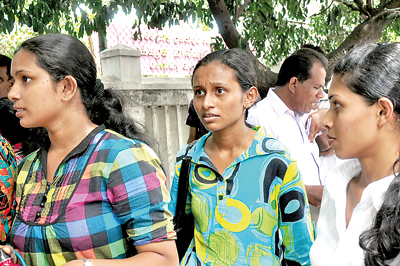Are students trained to pass exams or be creative – university don
View(s):At the annual convocation of the University of Sri Jayewardenepura, the keynote speaker asked a pertinent question that has grappled educationists, parents and students over the past four decades: “Are students being taught or trained to pass tests or are they trained to be creative and have a thirst for knowledge.”
These thoughts (meant to provoke policy makers) were raised by Prof. Uditha Liyanage, Director, Postgraduate Institute of Management, University of Sri Jayewardenepura delivering the convocation address of the university on July 11 in a presentation “On being educated”.
He quoted famed thinker Noam Chomsky as saying that education in an Enlightenment sense, is where the “highest goal in life is to inquire and create.”

File picture of University students outside the UGC protesting over the Z-Score
The purpose of education from this perspective is just to help people to learn on their own. “It is you the learner who is going to achieve in the course of education, and it is really up to you to determine how you are going to master and use it,” Prof. Liyanage said.
Excerpts of his speech:
As an essential part of this kind of education is fostering the impulse to challenge authority, think critically, and create alternatives to well-worn models. This is the pedagogy of Chomsky. He defines the opposing concept of education as indoctrination under which he includes vocational study and training. In this model, “people have the idea that from childhood, young people have to be placed in a framework where they are going to follow orders and conform to a set pattern of actions.” For Chomsky, this model of education imposes a debt which traps students into a life of conformity. That is the exact opposite of the Enlightenment view that he advocates.
To put it bluntly and perhaps differently: Is education for life or for work? John Dewey (2006) believes that the education process has two sides – one psychological and the other sociological – and that neither can be subordinated to the other, nor neglected without inevitable negative consequences. Dewey believes that the psychological which has intrinsic value and the social which has instrumental value are organically related and that education cannot be regarded as a compromise between the two, or a superimposition of one upon the other. Dewey adds that education must begin with a psychological insight into the child’s capacities, interests and habits. It must be controlled at every point by reference to these same considerations. These powers, interests and habits must be continually interpreted; we must know what they mean. They must be translated into terms of their social equivalents – into terms of what they are capable of in the way of social service. Hence, the intrinsic value of education to have a mind that is capable of inquiry and understanding should have its social implications. Indeed, such a mind has the capacity to create value for social entities. Treating the value of education purely in terms of social outputs that have utility and currency is as myopic as treating education purely as a self-serving psychological endeavour.
On learning

Prof. Uditha Liyanage
The urge to learn, to know and to comprehend that which is in, and around us, is a basic human trait that is intrinsic to our minds as hunger and thirst are to our bodies. In an operational sense, education is a process through which a society passes on knowledge, skills and values from one generation to another. Learning can be described as the acquisition of new knowledge, skills and values. Education is what one gets from external sources, while learning is what one does within oneself to know and respond. Education is the process of imparting knowledge, skills and values. Learning is the process of adopting them.
Conceptual Age
We have moved along, from an agricultural, to industrial, and then to the informational or knowledge era. We must become knowledge workers and create value by utilizing the information and knowledge we have so diligently and painstakingly acquired through formal education and our life experiences. In his book, ‘A whole new mind’, Daniel Pink (2006) argues that, as a society, we have transcended the Knowledge Age, and are now in a Conceptual Age where our problems no longer have a single verifiable answer. He argues that success in the Industrial and Knowledge Age was mainly determined by a “SAT-ocracy”; a series of tests throughout the education system that required logic and analysis to isolate a single correct answer to a complex problem.
Today, the Conceptual Age requires creativity, innovation and design skills more than any other. Pink asserts, as many others have, that our education system and processes are still firmly geared towards the needs of the Industrial and the Information Age, a fast disappearing era. It is as if our students are moving along an assembly line, where we diligently instill mathematics, reading and science skills and then test them to see how much they have retained, making sure they meet all the “standards of production”. Pink argues that, today, a successful member of society must bring something more and different to the table. Individuals are valued for their unique contributions and their ability to think creatively, take initiative and incorporate a global perspective into their decisions.
Age of Complexity
The emergence of the Conceptual Age, also called the Age of Imagination, reframes the educational and learning processes you must be engaged with in your quest for “continuous awakening”, the continuous development of yourselves, after all is said and done at this graduation. You must learn to recognize the increasing complexity that surrounds you. Complexity that is compounded by globalization and information technology. You must realize that your notions of simple, stable societal systems lack currency and validity.
Machine
If an organization is a machine, then we just need to identify and specify the parts accurately. Understanding the machine, and its workings is about knowing the parts and how they work separately and together. If the machine becomes dysfunctional, then the challenge is to isolate the part(s) which is dysfunctional and correct it, so that the whole machine, once again begins to tick normally. The machine metaphor has shaped our thinking about life and work for too long. It has made us believe that the machine’s behaviour is, by and large, predictable, and the accuracy with which one is able to predict its future behaviour is largely dependent on the amount of accurate information at hand. Indeed, our educational systems and learning processes have for long been modeled in this mechanistic fashion. Inevitably, the products of such a system and process will think and act in the self-same mechanistic fashion.
Value of Education
What is the central intent, the core purpose, of education? This question has been keenly addressed in the philosophy of education. The distinction between the intrinsic and instrumental value of education is at the heart of the debate on the value of education among policy makers, practitioners and philosophers of education. If one values education for its own sake, then one espouses the intrinsic value of education. On the other hand, if one treats education as a means to an end, then one focuses on the instrumental value of education.
Follow @timesonlinelk
comments powered by Disqus


